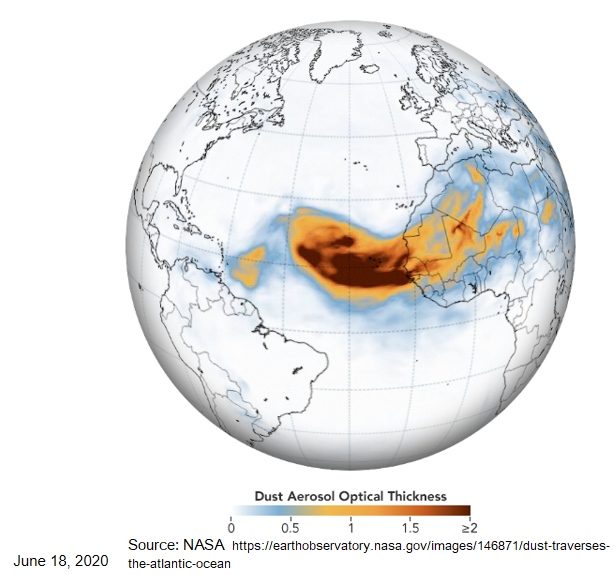The Sahara dust cloud reaching the US today could cause unhealthy air in the southeast. It is already causing particulate readings in eastern Texas and western Louisiana to be the unhealthy for sensitive groups (code orange). You can see the air quality map for your area or the whole country at the EPA AirNow website. By the weekend, air quality could reach the unhealthy range (code red), as it did a few days ago in Puerto Rico and other parts of the Caribbean.
During a code orange air pollution alert, the air is considered unhealthy for sensitive groups, which includes adults with lung, heart or other underlying conditions, and all children (because of air pollution’s effect on lung growth in children and teenagers). Children with asthma or other chronic conditions need to be careful when the air quality alert is code yellow, and they need to be extra careful during a code orange.
During a code red air pollution alert, the air is considered unhealthy for everyone. Adults with underlying conditions and children should be extra careful.
When the air quality has an alert for code orange or code red because of particulate matter (PM2.5 or PM10), what you do to protect your health depends on whether you have an underlying condition. In general, depending on your health conditions, it is recommended to reduce or avoid prolonged or heavy exertion, consider moving activities indoors, or take more frequent breaks if outdoors. You can read more details, specific to your health conditions, in the EPA guide for particle pollution.
Yale Climate Connections has a good article about the dust storm, how it formed, and where it is expected in the Southeast through the weekend. The article has some very good maps showing where the dust is expected to move over the next few days.
Because COVID-19 cases are spiking in several states in the Southeast right now, adding extra air pollution from the Sahara dust could cause even worse problems for people who are sick or become sick with the coronavirus.
Natural events like the Sahara dust storm add extra particulates to our already ongoing problems with air pollution. They show that we need to have lower levels of air pollution, so that when a natural event like a dust storm or wildfire happen, we are not in such dangerous territory for air quality.
Right now, during the COVID-19 pandemic, EPA is proposing to NOT STRENGTHEN standards for PM2.5 and PM10. They are doing this despite many scientific studies showing health is damaged at levels below the current standards. If you are a healthcare professional, please take the time to sign our letter to the EPA opposing this proposal.





